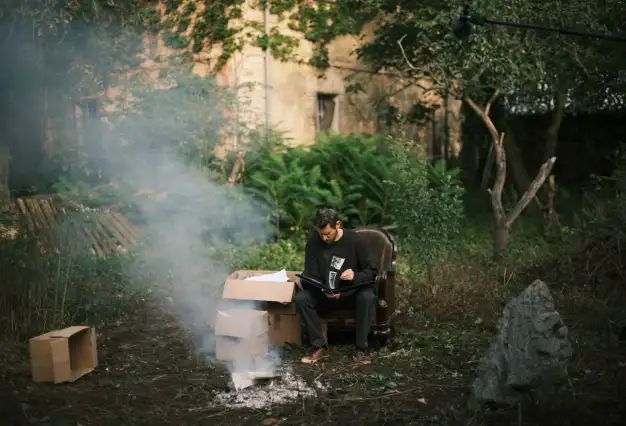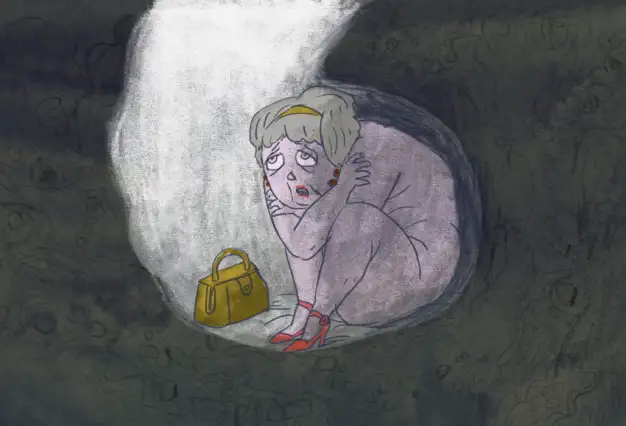
21 August 2024
Empathy and experiments in socially-conscious storytelling
Empathy and experiments in socially-conscious storytelling

Two emerging talents from the youngest generation of Czech filmmakers are committed to socially conscious storytelling. Both have gained international recognition for their short films and are now transitioning to feature-length projects. Anna Wowra crafts empathetic narratives that delve into the challenges faced by young adults, while Marie Magdalena Kochová blends traditional and experimental techniques to address social issues through hybrid genres. Despite their distinct formal approaches, both filmmakers combine personal and social issues with emphatic sensibilities.
by Martin Kudláč for CZECH FILM / Fall 2024
Anna Wowra: Rethinking young adults

Polish-born FAMU student Anna Wowra joins the ranks of emerging female filmmakers who began their careers in the Czech Republic despite being born elsewhere, such as Daria Kashcheeva and Diana Van Cam Nguyen. Having made several student films, Wowra’s latest work, Stuck Together, was recently highlighted by the European talent initiative Future Frames, as well as garnering accolades for Best Short Film at the Koszalin Film Debut Festival and the Best GENERATIONs Award at the Tirana International Film Festival. Wowra’s films stand out for their emotional narratives and character depth, evoking empathy for flawed, relatable characters. She specializes in depicting young-adult struggles with insightful accuracy. As she moves to feature-length projects, she plans to address more socially conscious themes while maintaining her empathetic approach.
Wowra studied at Jagiellonian University and the Film and Television Production Department of the Krzysztof Kieślowski Faculty of Radio and Television at the University of Silesia. She then continued her studies at the Film and TV School of the Academy of Performing Arts (FAMU) in Prague. During her academic journey, she has worked in various roles, including assistant director, production manager, and story producer, on projects in both the Czech Republic and Poland.
Wowra is also developing a career as an auteur, creating short films noted for their authenticity and social commentary. Her debut, #instalove (2015), produced at the Wajda School, follows two female friends seeking boyfriends through social media. Her next film, Average Happy Couple (2019), tells the story of the 11-year-old Roman’s attempts to approach an eighth-grade girl, continuing the themes from #instalove but this time from a boy’s perspective. With Every Dog Has Its Day (2021), she switched to a tragicomic documentary about an elderly chihuahua breeder coping with her son’s loss. The short chamber drama Beyond the Frontline (2022) explores the psychological and media repercussions faced by a doctor who contracts COVID-19 after the death of a young patient. And her most recent work, Stuck Together (2023), examines the complex dynamics among three teenage friends in a small town. Their aspirations of escaping their environment give rise to a simmering jealousy, which ultimately leads to tragedy.
On the verge of completing her studies at FAMU, Wowra is preparing to transition to feature-length projects. But before that, she needs to complete her graduation project, First, Do No Harm (Primum Non Nocere), cowritten by Alžbeta Gertli. This 30-minute drama follows Alice, a Polish gynecologist and devout Christian, who faces a moral dilemma when an old friend seeks an abortion. Describing the film as a thriller, Wowra adopts a medical doctor’s perspective to explore the tragic circumstances surrounding the deaths of Polish women. The film features a Czech-Polish cast led by Zuzana Částková, known for her role in Kashcheeva’s award-winning Electra, and Sandra Drzymalska, who starred in Jerzy Skolimowski’s EO. First, Do No Harm participated in the Focus SCRIPT initiative at the Cannes Film Festival. The project is produced by FAMU and coproduced by Lukáš Procházka of Moviola and FILMTALENT Zlín. Filming is scheduled to get under way in September 2024, with completion expected by April 2025.

Wowra’s feature-length directorial debut is set to be In Good Faith, currently in development. The film will explore reproductive rights amid the global rise of antifeminist sentiment. Set within a Catholic milieu, this coming-of-age story critiques the societal and personal impacts of Catholic guilt. Cowritten with Alžbeta Gertli, the film will feature a Czech-Polish cast of nonprofessional teenage actors. In Good Faith has participated in several workshops, including Czech Film Springboard and Les Arcs, where it was consulted with director Ruben Östlund. It has also received development support from the Czech Film Fund. Principal photography is slated to begin in 2026, with delivery expected the following year. For this project, Wowra plans to blend the realist poetics of Andrea Arnold with the narrative approach of Deniz Gamze Ergüven’s Mustang and the visual style of Guðmundur Arnar Guðmundsson’s Beautiful Beings.
Additionally, the young director has already drafted the script for her sophomore feature, To Move Mountains, a Euro road movie inspired by her own battle with cancer in her early twenties, cowritten by Wowra’s life partner, Vojtěch Novotný, who will also codirect. The dramedy, which promises to be an intimate and personal project, follows a young couple traveling across Europe while awaiting a life-saving organ transplant. Influenced by the French New Wave, the film aims to challenge the romanticization of illness and adolescence, while delving into taboo subjects related to patients who are terminally ill. Principal photography for To Move Mountains is envisioned for 2026, with completion the following year. Producers are currently exploring coproduction opportunities in the various countries where the story will unfold, ranging from the Balkans to Ireland.
Wowra is also working on an auteur autofiction series titled For an Indefinite Period, which explores the “quarter-life crisis” and burnout now being experienced by younger generations. Cowritten with Rachel Absolonová and Alica Bednáriková, the series aims to capture the realities of small-town life in Central Europe, following a young woman who returns to her sleepy hamlet of a hometown after studying abroad, grappling with unmet career and personal expectations. Wowra describes the series as a small-town version of Girls by Lena Dunham, infused with the cringe humor of Fleabag.
Marie Magdalena Kochová: Experiments, hybrids and social shifts

The year 2024 marks a pivotal moment for emerging Czech filmmaker Marie Magdalena Kochová. Her short fiction film 3 MWh premiered at the International Film Festival Rotterdam (IFFR), entering the history books as the first Czech film featured in IFFR’s Tiger Short Competition. Kochová was also recognized as a rising talent by the European initiative Future Frames, held at the Karlovy Vary International Film Festival, where she presented both 3 MWh and her feature-length debut, The Other One.
Her commitment to exploring societal issues through her work is evident. Viewing the filmmaking process as both a personal journey and a political statement, she approaches cinema as a medium of empathy and shared experience, believing in its transformative potential despite the challenges posed by contemporary media consumption trends.
With degrees in New Media from the University of Plzeň and Documentary Directing at FAMU, Kochová was a regular at international film festivals with her student projects prior to her 2024 breakthrough. Her career straddles both traditional and experimental filmmaking. Notable traditional works include the short documentaries Interlocker 1 (2017), a black-and-white portrait of a railway signal tower crew that received the Aramis Award, and OK2Pay (2019), a depiction of an eccentric amateur radio operator.
On the experimental side, Kochová’s short films examine the convergence of technology and society with a satiric edge. Will the World Remember Your Name? (2017) explores society’s fixation on self-representation through smartphone documentation, questioning how physical likeness has overtaken actions in the digital age. Apparatgeist (2019) addresses the impact of mobile phones on human interaction and identity, featuring clips that mirror social media feeds; it earned the Student Jury Special Mention at the Ji.hlava International Documentary Film Festival. Docu-fiction-dance hybrid Shells (2022), which has screened at many international festivals, including Hot Docs, and won the Best International Student Film Award at Cinedans, stars legendary Czech dancer Jan Minařík performing interpretative dance in a care home elevator, symbolizing aging’s limitations and exploring themes of decline and resilience.
Her latest fiction experimental work, 3 MWh, delves into the interplay between humans and energy in the midst of global crises. The narrative follows a nuclear power plant worker who imposes a personal electricity usage cap, facing critical allocation decisions as he nears his limit. Shot on 16mm film and enhanced with digital electrical discharges based on voice recordings, the film underscores humankind’s physical interactions with the world. Kochová describes it as “a political statement, a metaphor for society, and a personal confrontation with mortality.” Employing exposure techniques to deteriorate the film, it visually mirrors the protagonist’s journey, juxtaposing real-world imagery with internal soundscapes to explore the intersection of rationality and spirituality. The film captures the complexity of global systems and the existential search for meaning against a backdrop of environmental and social crises.

The Other One, Kochová’s feature-length documentary debut, which premiered at the Karlovy Vary IFF, offers an intimate portrait of Johana, a girl living in the shadow of her sister with disability. Drawing from her own experiences as a “glass child,” Kochová explores themes of guilt, love, and self-identity through the protagonist’s journey to adulthood. The time-lapse documentary candidly depicts family dynamics, with the crew blending into the family environment to capture genuine interactions. Kochová’s observational style and empathetic approach provide a nuanced portrayal of Johana’s inner world and the effects of her younger sister’s disability, emphasizing the psychological landscape of glass children. Chronicling Johanka’s final year of secondary school, the documentary highlights her internal struggle between personal aspirations and familial responsibilities. Quiet, contemplative cinematography mirrors her emotional weight, focusing on close-ups to convey inner conflict. Minimalistic yet touching, The Other One comments on society’s attitudes toward disability and caregiving, advocating for a better understanding of caregivers’ emotional states while exploring sisterhood, responsibility, and identity.
Kochová is already in postproduction with a new fiction short film, The Tower, produced by Eva Rejč of Fork Film. The project explores the roles individuals choose in life, questioning what makes someone a good mother, sister, or girlfriend, and how to meet expectations without losing oneself. These are the challenges faced by protagonist Tereza when her date is interrupted by an unexpected guest. Kochová and Rejč are also teaming up on another project, The Liminality, an experimental film poem to be shot on 35mm. The director plans to deconstruct and manipulate the film stock, similar to her work on 3 MWh.
In addition to her experimental projects, Kochová is developing feature-length films in a more traditional fiction storytelling style. Her feature fiction debut, Alfa Party, cowritten with Josef Kokta, is a coming-of-age story with elements of revenge comedy, exploring intergenerational conflicts with parents among a group of teenagers. The film is being produced by Mikuláš Novotný of Background Films. Kochová is also in the early stages with a documentary-fiction hybrid about societal fragility, though she plans to focus fully on hybrid genres in the near future.





